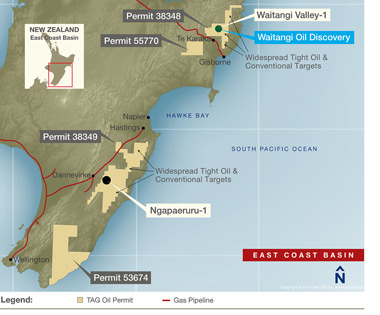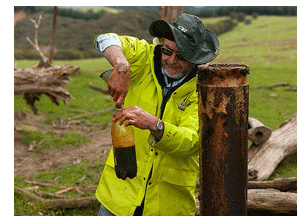 Vancouver, B.C. – May 5, 2014 – TAG Oil Ltd. (TSX: TAO) and (OTCQX: TAOIF) announces that the Gisborne District Council has granted TAG consent to drill the Waitangi Valley-1 well (TAG 100%), located in Petroleum Exploration Permit 38348 in the East Coast Basin, New Zealand. Earthwork activities are already underway to build an access road and drilling pad, with construction expected to be fully complete and drilling rig mobilized to the site by the end of June. Waitangi Valley-1 will be drilled to a total depth of 3600 meters, with the well targeting the naturally fractured Waipawa Black Shale and Whangai source rock formations.
Vancouver, B.C. – May 5, 2014 – TAG Oil Ltd. (TSX: TAO) and (OTCQX: TAOIF) announces that the Gisborne District Council has granted TAG consent to drill the Waitangi Valley-1 well (TAG 100%), located in Petroleum Exploration Permit 38348 in the East Coast Basin, New Zealand. Earthwork activities are already underway to build an access road and drilling pad, with construction expected to be fully complete and drilling rig mobilized to the site by the end of June. Waitangi Valley-1 will be drilled to a total depth of 3600 meters, with the well targeting the naturally fractured Waipawa Black Shale and Whangai source rock formations.
The Waipawa and Whangai formations are regarded as high-quality source rocks that compare technically to successful commercial tight-oil plays in North America, such as the Bakken Shale and Eagle Ford discoveries. The potential oil resource in the source rocks on TAG’s acreage is significant by world standards, with independent assessments on TAG-controlled lands estimated at an undiscovered resource potential of approximately 14 billion barrels of oil initially-in-place. The mid-range P50 assessment considers approximately 20% of TAG’s total land holdings, while the source rocks are interpreted to be widespread and, more importantly, accessible on a much greater area of the Company’s 1.5 million acres. The Waitangi Valley-1 well also has significant conventional discovery potential within multiple Miocene-aged formations in an area where oil has already been discovered under significant pressure.
Waitangi Valley-1 will be the first modern deep exploration well drilled in the Waitangi Hill area: The historical Waitangi-1 oil discovery in 1912 produced 50 degree API sweet light crude from an oil reservoir at approximately 300 meters depth1. Geotechnical work done on oil samples taken from the Waitangi-1 well, which still produces live oil to surface today, and nearby oil seeps and oil samples from the five shallow Waitangi Hill wells TAG drilled in 2011, conclusively confirmed the “oil kitchen” is working and the underlying Waipawa and Whangai Formations are the source of this high-quality, movable oil making these naturally fractured oil and gas source rocks a prime unconventional exploration target.
“We are extremely pleased to receive this consent and we thank the Gisborne District Council for their diligence leading to this decision,” said Garth Johnson, TAG Oil Ltd. Chief Executive Officer. “The Waitangi Valley well is one of TAG’s high priority exploration prospects which was technically validated through work in our previous joint venture with Apache, and therefore we are very excited to drill this well. It is our vision to establish the country’s first unconventional oil production and prove commerciality of this potentially very large resource.”
1 Such information is derived from a variety of publicly available information from government sources, regulatory agencies, public databases or other industry participants (as at the date stated therein) that TAG believes are predominantly independent in nature.
TAG Oil Ltd.
TAG Oil Ltd. (https://tagoil.com/) is a Canadian-based production and exploration company with operations focused exclusively in New Zealand. With 100% ownership over all its core assets, including extensive oil and gas production infrastructure, TAG is enjoying significant organic value creation through exploration success and ongoing development and appraisal drilling of several light oil and gas discoveries. As New Zealand’s leading explorer, TAG actively drills high-impact conventional and unconventional exploration prospects identified in the Taranaki Basin, East Coast Basin and Canterbury Basin that covers more than 2.7 million net acres of land, prospective for major discovery in New Zealand.
For further information:
Dan Brown or Garth Johnson
Phone: 1-604-682-6496
Email: [email protected]
Website: https://tagoil.com/
Blog: http://blog.tagoil.com/
Resource Estimates:
The resource estimates in this document were prepared by Sproule International Limited with an effective date of July 31, 2013, and by AJM Petroleum Consultants with an effective date of September 1, 2008. Each is a qualified reserves evaluator in accordance with NI 51-101 and the Canadian Oil and Gas Evaluations Handbook.
Best Estimate is considered to be the best estimate of the in-place volumes that will actually be present. It is equally likely that the actual in-place volumes will be greater or less than the best estimate. If probabilistic methods are used, there should be at least a 50 percent probability (P50) that the in-place volumes will equal or exceed the best estimate.
Undiscovered Resources:
Undiscovered Oil Initially-In-Place (equivalent to undiscovered resources) is that quantity of petroleum that is estimated, on a given date, to be contained in accumulations yet to be discovered. The recoverable portion of undiscovered petroleum initially in place is referred to as “prospective resources,” the remainder as “unrecoverable.”
Prospective resources are those quantities of petroleum estimated, as of a given date, to be potentially recoverable from undiscovered accumulations by application of future development projects. Prospective resources have both an associated chance of discovery and a chance of development. There is no certainty that any portion of the resources will be discovered. If discovered, there is no certainty that it will be commercially viable to produce any portion of the resources.
Exploration for hydrocarbons is a speculative venture necessarily involving substantial risk. TAG’s future success in exploiting and increasing its current reserve base will depend on its ability to develop its current properties and on its ability to discover and acquire properties or prospects that are capable of commercial production. However, there is no assurance that TAG’s future exploration and development efforts will result in the discovery or development of additional commercial accumulations of oil and natural gas. In addition, even if further hydrocarbons are discovered, the costs of extracting and delivering the hydrocarbons to market and variations in the market price may render uneconomic any discovered deposit. Geological conditions are variable and unpredictable. Even if production is commenced from a well, the quantity of hydrocarbons produced inevitably will decline over time, and production may be adversely affected or may have to be terminated altogether if TAG encounters unforeseen geological conditions. TAG is subject to uncertainties related to the proximity of any reserves that it may discover to pipelines and processing facilities. It expects that its operational costs will increase proportionally to the remoteness of, and any restrictions on access to, the properties on which any such reserves may be found. Adverse climatic conditions at such properties may also hinder TAG’s ability to carry on exploration or production activities continuously throughout any given year.
The significant positive factors that are relevant to the resource estimate are:
- Proven production in close proximity;
- Proven commercial quality reservoirs in close proximity; and
- Oil and gas shows while drilling wells nearby.
The significant negative factors that are relevant to the resource estimate are:
- Tectonically complex geology could compromise seal potential; and
- Seismic attribute mapping in the two, deep, liquids’-rich gas plays can be indicative but not certain in identifying proven resource.
Analogous Information:
Certain information in the Information Materials may constitute “analogous information” as defined in NI 51-101, including, but not limited to, information relating to the areas in geographical proximity to the lands held by TAG. Such information is derived from a variety of publicly available information from government sources, regulatory agencies, public databases or other industry participants (as at the date stated therein) that TAG believes are predominantly independent in nature. TAG believes this information is relevant as it helps to define the reservoir characteristics in which TAG may hold an interest. TAG is unable to confirm that the analogous information was prepared by a qualified reserves evaluator or auditor or in accordance with the Canadian Oil and Gas Evaluator Handbook. Such information is not an estimate of the reserves or resources attributable to lands held or to be held by TAG and there is no certainty that the reservoir data and economics information for the lands held by TAG will be similar to the information presented therein. The reader is cautioned that the data relied upon by TAG may be in error and/or may not be analogous to TAG’s land holdings.
Cautionary Note Regarding Forward-Looking Statements:
Statements contained in this news release that are not historical facts are forward-looking statements that involve various risks and uncertainty affecting the business of TAG. Such statements can be generally, but not always, identified by words such as “expects”, “plans”, “anticipates”, “intends”, “estimates”, “forecasts”, “schedules”, “prepares”, “potential” and similar expressions, or that events or conditions “will”, “would”, “may”, “could” or “should” occur. All estimates and statements that describe the Company’s objectives, goals, and or future plans with respect to the drilling in the East Coast Basin are forward-looking statements under applicable securities laws and necessarily involve risks and uncertainties including, without limitation: risks associated with oil and gas exploration, development, exploitation and production, geological risks, marketing and transportation, availability of adequate funding, volatility of commodity prices, environmental risks, competition from other producers, and changes in the regulatory and taxation environment. Actual results may vary materially from the information provided in this release, and there is no representation by TAG Oil that the actual results realized in the future would be the same in whole or in part as those presented herein.
Other factors that could cause actual results to differ from those contained in the forward-looking statements are also set forth in filings that TAG and its independent evaluator have made, including TAG’s most recently filed reports in Canada under NI 51-101, which can be found under TAG’s SEDAR profile at www.sedar.com.
TAG undertakes no obligation, except as otherwise required by law, to update these forward-looking statements in the event that management’s beliefs, estimates or opinions, or other factors change.
